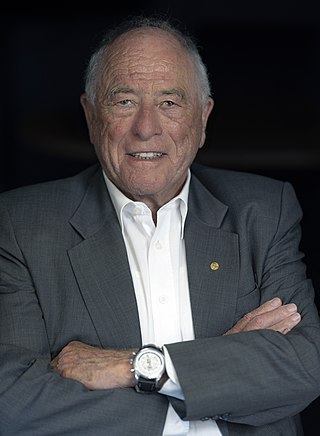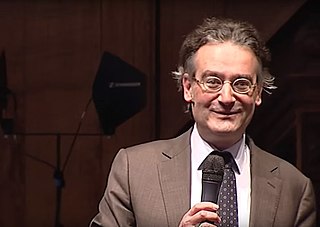
Kurt Wüthrich is a Swiss chemist/biophysicist and Nobel Chemistry laureate, known for developing nuclear magnetic resonance (NMR) methods for studying biological macromolecules.

Nicolaas Bloembergen was a Dutch-American physicist and Nobel laureate, recognized for his work in developing driving principles behind nonlinear optics for laser spectroscopy. During his career, he was a professor at Harvard University and later at the University of Arizona and at Leiden University in 1973.

SRON Netherlands Institute for Space Research (SRON) is a national Dutch institute for space research. It develops and uses innovative technology for analysis in space, focusing on astrophysical research, Earth observation, and exoplanetary research. SRON research includes new and more advanced sensors for X-rays, infrared radiation, and visible light.

Johannes Martin Bijvoet was a Dutch chemist and crystallographer at the van 't Hoff Laboratory at Utrecht University. He is famous for devising a method of establishing the absolute configuration of molecules. In 1946, he became member of the Royal Netherlands Academy of Arts and Sciences.

The Dutch Research Council is the national research council of the Netherlands. NWO funds thousands of top researchers at universities and institutes and steers the course of Dutch science by means of subsidies and research programmes. NWO promotes quality and innovation in science. NWO is an independent administrative body under the auspices of the Dutch Ministry of Education, Culture and Science. NWO directs its approximate budget of 1 billion euros towards Dutch universities and institutes, often on a project basis. Also, NWO has its own research institutes and facilitates international cooperation. Current president of NWO since April 1, 2021 is Marcel Levi. Former NWO presidents include Stan Gielen, Peter Nijkamp and Jos Engelen.

Sir Christopher Martin Dobson was a British chemist, who was the John Humphrey Plummer Professor of Chemical and Structural Biology in the Department of Chemistry at the University of Cambridge, and Master of St John's College, Cambridge.
Alexander Alexeyevich Makarov, is a Russian physicist who led the team that developed the Orbitrap, a type of mass spectrometer, and received the 2008 American Society for Mass Spectrometry Distinguished Contribution in Mass Spectrometry Award for this development. In November 2013 he was appointed to Professor by Special Appointment of High Resolution Mass Spectrometry at the Department of Chemistry and the Bijvoet Center for Biomolecular Research of Utrecht University in the Netherlands.
Robert Guy Griffin is a Professor of Chemistry and director of the Francis Bitter Magnet Laboratory at Massachusetts Institute of Technology (MIT). He is known for his work in nuclear magnetic resonance (NMR) and developing high-field dynamic nuclear polarisation (DNP) for the study of biological solids. He has contributed many different methods and approaches now widely used in solid-state NMR spectroscopy, in particular in context of magic-angle-spinning NMR. For example, this extends to methods for resolution enhancement via heteronuclear decoupling, as well as techniques for polarisation transfer between nuclei.

Albert J.R. Heck is a Dutch scientist and professor at Utrecht University, the Netherlands in the field of mass spectrometry and proteomics. He is known for his work on technologies to study proteins in their natural environment, with the aim to understand their biological function. Albert Heck was awarded the Spinoza Prize in 2017, the highest scientific award in the Netherlands.
David A. Agard is a professor of biochemistry and biophysics at the University of California, San Francisco. He earned his B.S. in molecular biochemistry and biophysics from Yale University and his Ph.D. in biological chemistry from California Institute of Technology. His research is focused on understanding the basic principles of macromolecular structure and function. He is a scientific director of the Institute for Bioengineering, Biotechnology, and Quantitative Biomedical Research and has been a Howard Hughes Medical Institute (HHMI) investigator since 1986.

Piet Gros is a Dutch chemist and professor biomacromolecular crystallography at Utrecht University. In 2010 he received the NWO Spinoza Prize for the elucidation of the three-dimensional structure of the C3 protein, which plays a central role in the complement system and contributes to innate immunity.

Joachim Heinrich Seelig is a German physical chemist and specialist in NMR Spectroscopy. He is one of the founding fathers of the Biozentrum of the University of Basel. He reached emeritus status in 2012.
The Royal Netherlands Institute for Sea Research, also known as NIOZ, in Dutch the Nederlands Instituut voor Onderzoek der Zee, is the Dutch national oceanographic institute. It is located on the island of Texel, and in Yerseke, in the Netherlands. The institute was founded in 1876 as the Zoological Station and in 1960 it was renamed to its current name. NIOZ carries out marine research in the waters of the Netherlands and overseas; it also plays a role in educating students, and it offers research facilities to marine scientists from the Netherlands and other countries worldwide. NIOZ has a longstanding collaboration with Utrecht University, for instance in an interdisciplinary Master’s programme Marine Sciences. NIOZ is part of the institutes organization of the Dutch Research Council (NWO).

Balthassar Jozef Paul "Bas" van Bavel is a Dutch historian. He has held the chair of Transitions of Economy and Society at Utrecht University since 2011, and has been professor of Economic and Social History since 2007. His research has mostly focused on pre-industrial Northwestern Europe. He was one of the winners of the 2019 Spinoza Prize, the highest award in Dutch science.
Marc Baldus is a physicist and professor of NMR spectroscopy at Utrecht University. He is especially known for his work in the field of structural biology using solid-state nuclear magnetic resonance (ssNMR) spectroscopy. He applies ssNMR methods to establish structure-function relationships in complex biomolecular systems including membrane and Amyloid proteins. In addition, he develops cellular NMR methods to study large molecular transport and insertion systems in bacteria as well as signal transduction mechanisms in eukaryotic cells.

Josina Maria "Jozien" Bensing is a Dutch clinical psychologist. Bensing was director of the Nederlands Instituut voor Onderzoek van de Gezondheidszorg (NIVEL) between 1985 and 2008. Since 1993 she has been a professor of clinical and healthcare psychology at Utrecht University. Bensing was a winner of the 2006 Spinoza Prize.

Johannes Frederik Gerardus (Hans) Vliegenthart is a Dutch emeritus professor in bioorganic chemistry of Utrecht University, well known for his research on the synthesis and characterisation of carbohydrates, and biomolecules containing sugar moieties such as glycoproteins and their role in living cells.

Ron M.A. Heeren is a Dutch scientist in mass spectrometry imaging. He is currently a distinguished professor at Maastricht University and the scientific director of the Multimodal Molecular Imaging Institute (M4I), where he heads the division of Imaging Mass Spectrometry.
ARISE is a Dutch scientific research program that aims to completely map biodiversity in the European territory of the Netherlands. In addition, the goal is to set up semi-automatic infrastructure that can identify species using image and sound recognition technology, radar data, and environmental DNA (eDNA).
Reuven Agami is a Dutch cancer researcher. He is a professor of Oncogenomics at Erasmus University Rotterdam and head of the section of Oncogenomics at the Netherlands Cancer Institute-Antoni van Leeuwenhoekziekenhuis. Since October 2023 the Royal Netherlands Academy of Arts and Sciences (KNAW) has selected Reuven Agami as a member.













